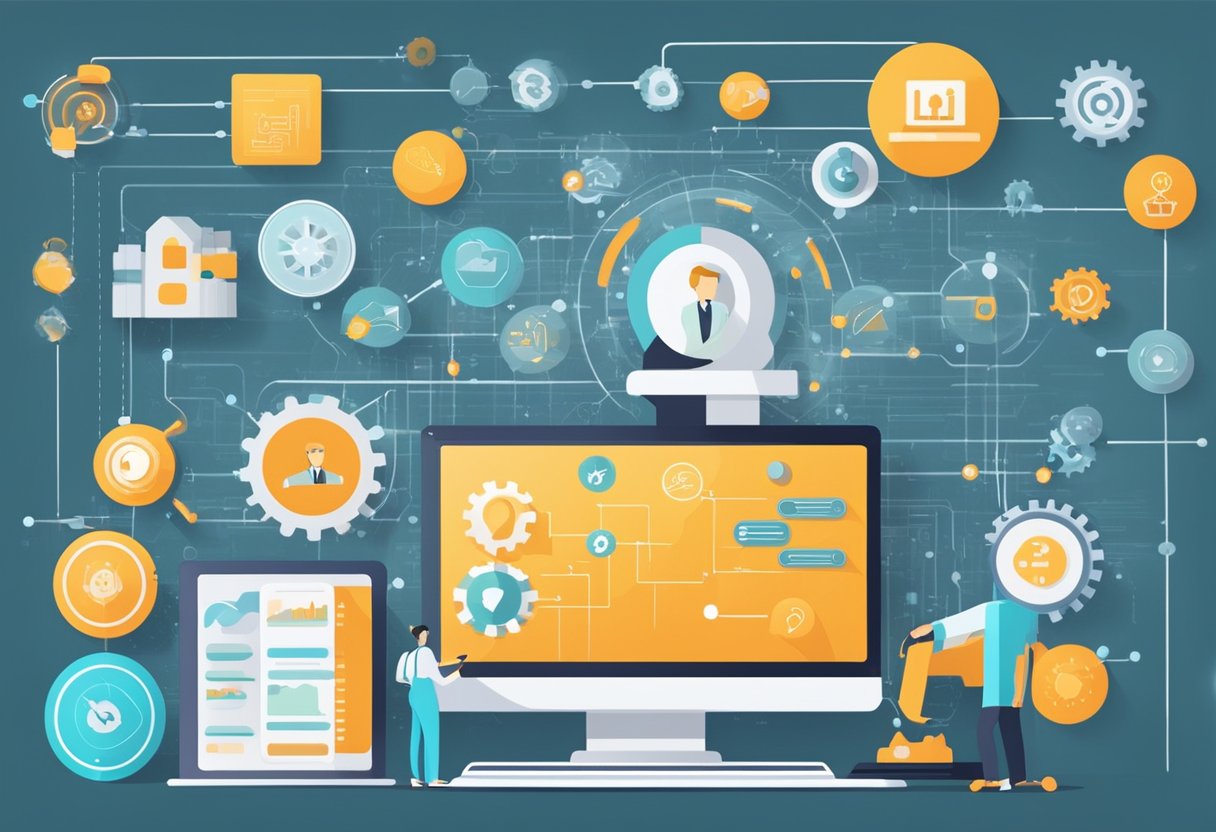Small businesses often struggle with limited resources and manpower, making it difficult to streamline their operations and remain competitive in today’s market.
However, with the advent of artificial intelligence (AI) automation tools, small businesses are now able to automate their operations, reduce manual intervention, and save valuable time and resources.
AI automation tools offer a range of benefits to small businesses, including the ability to automate repetitive tasks, enhance customer experience, and improve operational efficiency.
By leveraging AI chatbots, businesses can provide 24/7 availability to customers, freeing up valuable time and resources previously spent on addressing repetitive inquiries.
Additionally, AI technology offers several other ways for small businesses to streamline their operations, including inventory management, accounting, and supply chain management.
Key Takeaways
- AI automation tools offer a range of benefits to small businesses, including the ability to automate repetitive tasks, enhance customer experience, and improve operational efficiency.
- By leveraging AI chatbots, businesses can provide 24/7 availability to customers, freeing up valuable time and resources previously spent on addressing repetitive inquiries.
- Overall, AI automation tools have the potential to revolutionize the way small businesses operate, offering a range of benefits that can help them remain competitive in today’s market.
Understanding AI and Its Impact on Small Businesses
Artificial Intelligence (AI) is a technology that has revolutionized various industries, including small businesses.
AI is an umbrella term that refers to machines that can perform tasks that typically require human intelligence, such as learning, reasoning, and problem-solving.
AI has become an indispensable tool for small businesses, as it can streamline operations, enhance customer experience, and increase profitability.
The Basics of AI Technology
AI technology uses algorithms and statistical models to analyze data and make predictions.
Machine learning is a subset of AI that involves the use of algorithms to learn from data and improve performance over time.
Deep learning is a more advanced form of machine learning that involves the use of artificial neural networks to simulate the human brain’s function.
Natural language processing (NLP) is another subset of AI that involves the ability of machines to understand and interpret human language.
AI’s Role in Enhancing Operational Efficiency
Small businesses can leverage AI automation tools to streamline their operations and increase efficiency.
For example, AI-powered chatbots can handle customer inquiries and provide instant responses, reducing the need for human customer service representatives.
AI can also be used to automate routine tasks such as data entry, freeing up employees to focus on more complex tasks.
Additionally, AI can analyze data to identify patterns and trends, enabling small businesses to make data-driven decisions.
AI Automation Tools for Different Business Functions

Small businesses can benefit from AI automation tools in various aspects of their operations. Here are some ways AI automation tools can streamline different business functions:
Streamlining Customer Service with AI
AI-powered chatbots can assist customers 24/7, answering frequently asked questions, and providing personalized recommendations.
Chatbots can also collect customer feedback and help businesses improve their services. Some popular AI-powered chatbot tools for small businesses include Tars, BotStar, and FlowXO.
Optimizing Marketing and Sales Efforts
AI automation tools can help small businesses optimize their marketing and sales efforts by analyzing customer data and providing insights.
For example, tools like HubSpot and Marketo can help businesses automate their email marketing campaigns, while Hootsuite and Sprout Social can help manage social media accounts.
AI-powered tools like Adext can optimize online advertising campaigns by automatically adjusting ad targeting and budgets.
Improving Financial Management and Analysis
AI automation tools can help small businesses manage their finances more efficiently by automating tasks like invoicing, bookkeeping, and expense tracking.
Tools like QuickBooks and Xero can automate financial management tasks, while tools like Mint and Personal Capital can help with personal finance management.
AI-powered tools like Fyle can automate expense management by scanning receipts and invoices and automatically categorizing expenses.
Integrating AI Tools into Business Workflows
Small businesses can benefit greatly from integrating AI tools into their workflows. These tools can help streamline operations, reduce costs, and improve overall efficiency. However, choosing the right AI tools for a business can be a daunting task.
Choosing the Right AI Tools for Your Business
When selecting AI tools, small businesses should consider the following factors:
- Task automation: The AI tool should automate repetitive tasks to help save time and reduce errors.
- Customization: The software should be adaptable to allow users to tailor their workflows to their specific needs.
- Integration: The AI tool should seamlessly integrate with other business tools and systems, ensuring a unified workflow environment.
- Data analysis: The AI tool should be able to analyze data to provide insights and recommendations.
Machine learning is a key component of AI tools. It allows the software to learn and adapt over time, improving its performance and accuracy.
Small businesses should look for AI tools that use machine learning to provide the best results.
Seamless Integration and Data Analysis
Seamless integration is essential when integrating AI tools into business workflows. The software should work seamlessly with existing tools and systems, ensuring a smooth transition.
Data analysis is also crucial. The AI tool should be able to analyze data to provide insights and recommendations that can help improve business operations.
Small businesses should consider using AI tools such as Leap, Simplicity, and Kissflow Workflow.
These tools offer task automation, customization, integration, and data analysis capabilities. They can help small businesses streamline their operations and improve overall efficiency.
Overcoming Challenges and Mitigating Risks
Small businesses may face several challenges when implementing AI automation tools. These challenges can be addressed by ensuring that the organization has the right resources, including adequate technical expertise and financial resources.
Additionally, ensuring that the organization is compliant with relevant regulations and standards is crucial to mitigating risks.
Addressing Common AI Implementation Challenges
One of the most significant challenges that small businesses face when implementing AI automation tools is the lack of technical expertise.
Small businesses may not have the resources to hire a dedicated team of AI experts, leaving them with limited options for implementation.
However, there are several ways that small businesses can address this challenge. For example, they can partner with AI vendors that offer pre-built solutions or hire consultants to help them with implementation.
Another challenge that small businesses face is the lack of data-driven decision-making processes.
To address this challenge, small businesses can invest in data analytics tools that allow them to collect and analyze data.
This data can then be used to inform decision-making processes and improve the overall efficiency of the organization.
Ensuring Security and Compliance
One of the biggest risks associated with AI automation tools is the potential for security breaches.
Small businesses must ensure that their systems are secure and that they are compliant with relevant regulations and standards.
This includes ensuring that they have adequate security measures in place, such as firewalls and encryption, and that they are following best practices for data management.
Small businesses must also ensure that they are compliant with relevant regulations and standards, such as GDPR and HIPAA.
This includes ensuring that they are collecting and storing data in a way that is compliant with these regulations and that they are following best practices for data management.
Future-Proofing Your Small Business with AI
Small businesses face many challenges, and one of the biggest is keeping up with market changes.
Fortunately, AI automation tools can help streamline operations and provide real-time insights that can help businesses adapt and thrive. In this section, we’ll explore how AI can help small businesses achieve sustainable growth and scalability.
Adapting to Market Changes with AI Insights
One of the biggest advantages of using AI automation tools is the ability to gain real-time insights into market changes.
Predictive analytics can help small businesses identify trends and patterns that may not be immediately apparent. This can help businesses make informed decisions about how to adapt to changing market conditions.
For example, AI-powered sales automation tools can help small businesses streamline the sales process, from lead generation to closing deals.
These tools process vast amounts of information in no time and give businesses real-time insights into customer behavior.
This can help businesses identify trends and patterns that may not be immediately apparent, allowing them to adapt their strategies accordingly.
Achieving Sustainable Growth and Scalability
Another advantage of using AI automation tools is the ability to achieve sustainable growth and scalability.
By automating routine tasks, businesses can free up time and resources to focus on more complex issues. This can help businesses scale up more quickly and efficiently than they would be able to otherwise.
For example, Leap is an innovative AI tool that empowers small businesses to automate their work processes and boost productivity.
With the power of AI, Leap allows users to create custom AI automations without any coding knowledge. This can help businesses streamline operations and achieve sustainable growth and scalability.
Embracing AI for Small Business Success
In conclusion, AI automation tools can help small businesses achieve sustainable growth and scalability by providing real-time insights and streamlining operations.
By embracing AI, small businesses can stay ahead of market changes and adapt to new challenges more quickly and efficiently than they would be able to otherwise.



